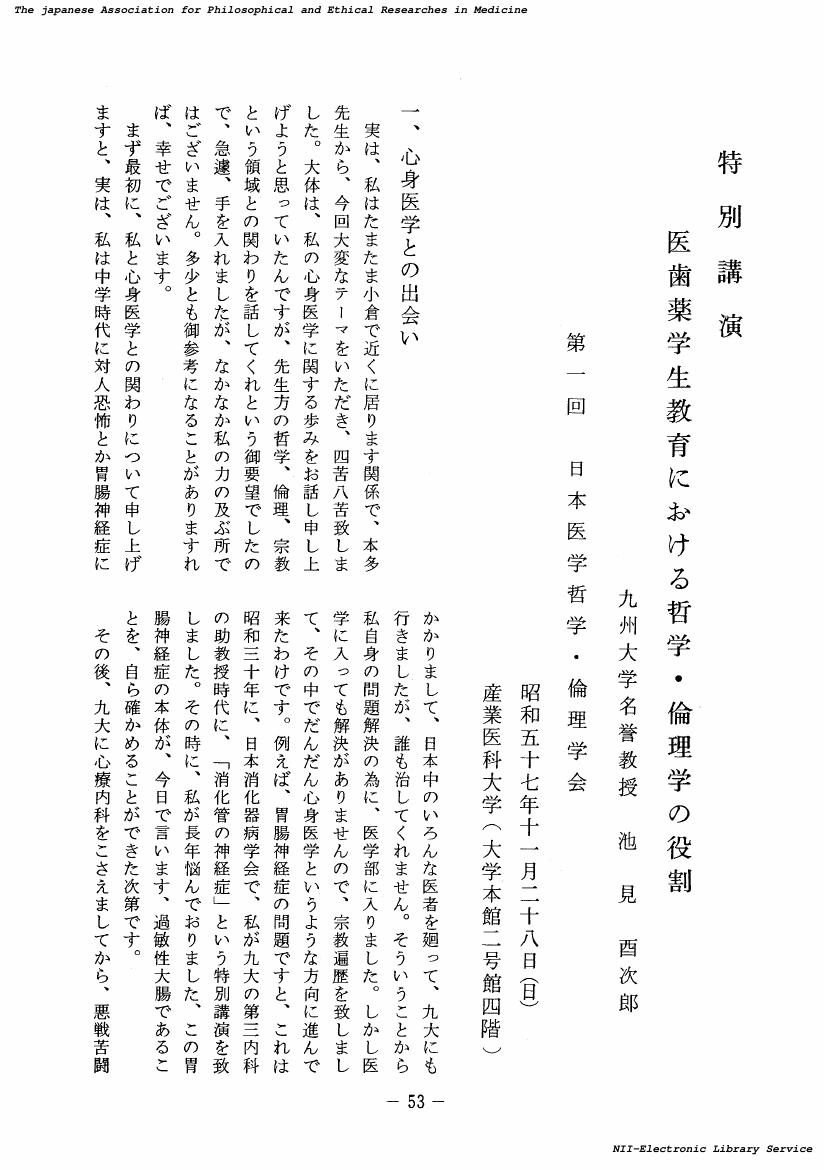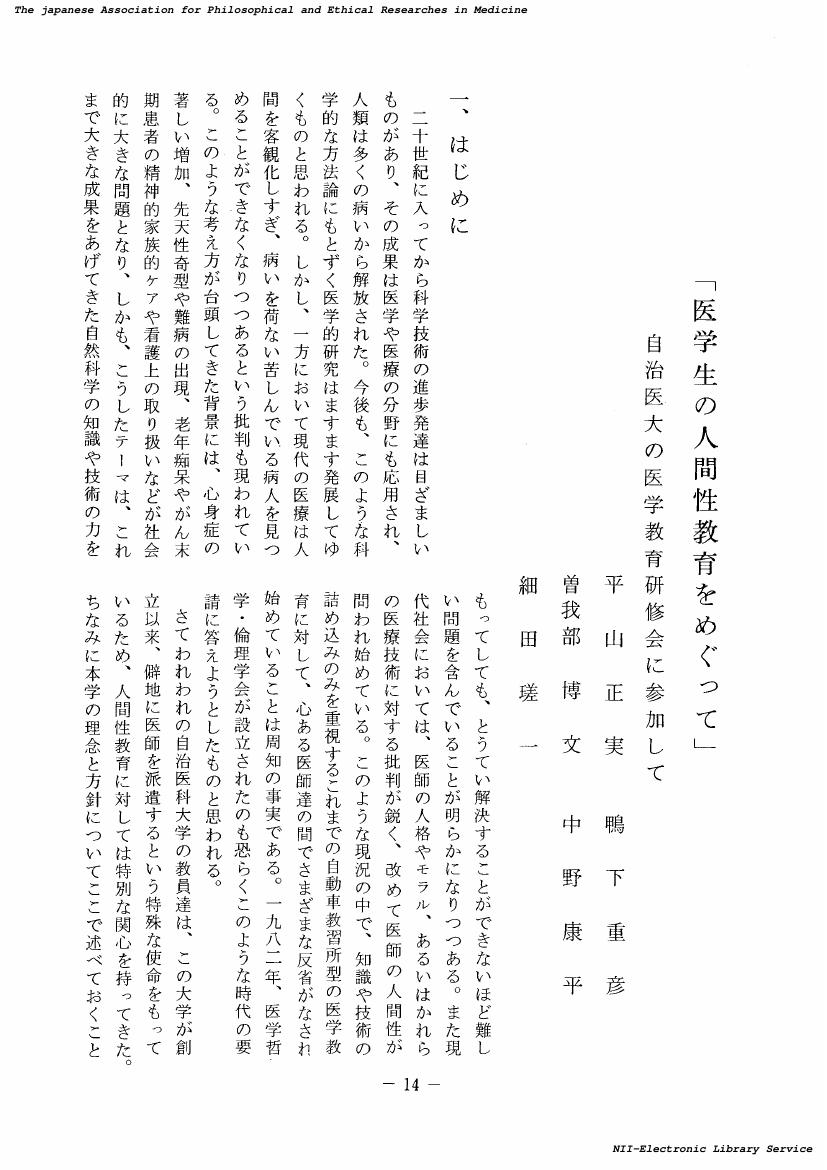1 0 0 0 OA 高間会長より返礼として中国大連理論医学研究所に贈呈した掛軸
- 出版者
- 日本医学哲学・倫理学会
- 雑誌
- 医学哲学 医学倫理 (ISSN:02896427)
- 巻号頁・発行日
- vol.3, pp.App2, 1985-07-05 (Released:2018-02-01)
1 0 0 0 OA 甘瞑の医学 : 近代医学の反省
- 著者
- 池辺 義教
- 出版者
- 日本医学哲学・倫理学会
- 雑誌
- 医学哲学 医学倫理 (ISSN:02896427)
- 巻号頁・発行日
- vol.3, pp.56-70, 1985-07-05 (Released:2018-02-01)
1 0 0 0 OA 大脳半球機能と思考型(第一報)
- 著者
- 品川 嘉也 菊池 美也子
- 出版者
- 日本医学哲学・倫理学会
- 雑誌
- 医学哲学 医学倫理 (ISSN:02896427)
- 巻号頁・発行日
- vol.3, pp.83-94, 1985-07-05 (Released:2018-02-01)
1 0 0 0 OA 医歯薬系大学における倫理学教育の問題点について
- 著者
- 桜井 弘木
- 出版者
- 日本医学哲学・倫理学会
- 雑誌
- 医学哲学 医学倫理 (ISSN:02896427)
- 巻号頁・発行日
- vol.1, pp.42-48, 1983-11-15 (Released:2018-02-01)
1 0 0 0 OA 産業医科大学長挨拶
- 著者
- 土屋 健三郎
- 出版者
- 日本医学哲学・倫理学会
- 雑誌
- 医学哲学 医学倫理 (ISSN:02896427)
- 巻号頁・発行日
- vol.1, pp.49-52, 1983-11-15 (Released:2018-02-01)
1 0 0 0 OA 医歯薬学生教育における哲学・倫理学の役割
- 著者
- 池見 酉次郎
- 出版者
- 日本医学哲学・倫理学会
- 雑誌
- 医学哲学 医学倫理 (ISSN:02896427)
- 巻号頁・発行日
- vol.1, pp.53-73, 1983-11-15 (Released:2018-02-01)
1 0 0 0 OA 現代における医学と哲学との接点
- 著者
- 秋月 龍[ミン] 坂本 亮 石渡 隆司 岡田 雅勝
- 出版者
- 日本医学哲学・倫理学会
- 雑誌
- 医学哲学 医学倫理 (ISSN:02896427)
- 巻号頁・発行日
- vol.1, pp.74-103, 1983-11-15 (Released:2018-02-01)
1 0 0 0 OA 学会誕生までの経緯
- 出版者
- 日本医学哲学・倫理学会
- 雑誌
- 医学哲学 医学倫理 (ISSN:02896427)
- 巻号頁・発行日
- vol.1, pp.104-106, 1983-11-15 (Released:2018-02-01)
1 0 0 0 OA 医学生の人間性教育をめぐって : 自治医大の医学教育研修会に参加して
- 著者
- 平山 正実 鴨下 重彦 曽我部 博文 中野 康平 細田 瑳一
- 出版者
- 日本医学哲学・倫理学会
- 雑誌
- 医学哲学 医学倫理 (ISSN:02896427)
- 巻号頁・発行日
- vol.2, pp.14-22, 1984-10-20 (Released:2018-02-01)
1 0 0 0 OA 献体の実情と諸問題
- 著者
- 郡司 乕雄
- 出版者
- 日本医学哲学・倫理学会
- 雑誌
- 医学哲学 医学倫理 (ISSN:02896427)
- 巻号頁・発行日
- vol.2, pp.60-64, 1984-10-20 (Released:2018-02-01)
1 0 0 0 OA 創刊の辞 : 明日に向って歩む
- 著者
- 高間 直道
- 出版者
- 日本医学哲学・倫理学会
- 雑誌
- 医学哲学 医学倫理 (ISSN:02896427)
- 巻号頁・発行日
- vol.1, pp.1, 1983-11-15 (Released:2018-02-01)
1 0 0 0 OA 精神分裂病の幻聴に伴なう諸問題
- 著者
- 酒井 明夫
- 出版者
- 日本医学哲学・倫理学会
- 雑誌
- 医学哲学 医学倫理 (ISSN:02896427)
- 巻号頁・発行日
- vol.1, pp.2-14, 1983-11-15 (Released:2018-02-01)
1 0 0 0 OA ヒポクラテスと「コス学派の予後」について
- 著者
- 岸本 良彦
- 出版者
- 日本医学哲学・倫理学会
- 雑誌
- 医学哲学 医学倫理 (ISSN:02896427)
- 巻号頁・発行日
- vol.1, pp.15-28, 1983-11-15 (Released:2018-02-01)
1 0 0 0 OA 大学における教養科目の視点からの身体論の試み
- 著者
- 加藤 直克
- 出版者
- 日本医学哲学・倫理学会
- 雑誌
- 医学哲学 医学倫理 (ISSN:02896427)
- 巻号頁・発行日
- vol.1, pp.29-41, 1983-11-15 (Released:2018-02-01)
- 著者
- 川口 浩一
- 出版者
- 日本医学哲学・倫理学会
- 雑誌
- 医学哲学 医学倫理 (ISSN:02896427)
- 巻号頁・発行日
- vol.17, pp.203-210, 1999
1 0 0 0 創刊の辞 : 明日に向って歩む
- 著者
- 高間 直道
- 出版者
- 日本医学哲学・倫理学会
- 雑誌
- 医学哲学 医学倫理 (ISSN:02896427)
- 巻号頁・発行日
- vol.1, 1983
- 著者
- 児玉 正幸
- 出版者
- 日本医学哲学・倫理学会
- 雑誌
- 医学哲学 医学倫理 (ISSN:02896427)
- 巻号頁・発行日
- vol.21, pp.167-175, 2003
The medical staff of Obstetrics and Gynecology Department, Kagoshima University was considering plans to conduct clinical trials to test the embryos of Duchenne muscular dystrophy patients, but they were unable to gain approval from the Japan Society of Obstetrics and Gynecology. Groups and organizations that support the handicapped pointed out that there are problems with trying to make life and death decisions based on such tests. They argued that such testing implies a desire to lower the level of social services for the handicapped and to inflame the public's prejudices. In other words, the tests are considered as another example of discrimination towards families with a history of genetic disease, in the tradition of discrimination in jobs and marriage. However, as long as the freedom of the clients (the parents of the unborn child) for whom the tests are conducted is preserved, and their right to decide what to do with the results is protected, this reproduction medical technology does not threaten the constitutional rights of the handicapped, as provided in Articles 13, 14, and 25 of the Japanese Constitution. Allowing parents to decide whether to give birth to a handicapped child is not inconsistent with a policy aimed at improving welfare services.
1 0 0 0 医療過誤と道徳的運(moral luck)の問題
- 著者
- 長田 蔵人
- 出版者
- 日本医学哲学・倫理学会
- 雑誌
- 医学哲学 医学倫理 (ISSN:02896427)
- 巻号頁・発行日
- vol.27, pp.60-68, 2009
We usually recognize instinctively that it is unreasonable to be blamed for something beyond our control or expectations, and that we should be morally evaluated in terms of motives or intensions, which are insusceptible to luck. On the other hand, however, we admit in many cases that luck exerts some influence on agents' moral evaluations. This inconsistency has long been discussed as the problem of 'moral luck'. This paper shows that the same inconsistency can be found in our attitude toward medical malpractice, and considers how to deal with it. According to D. Dickenson, who introduced the concept of moral luck into discussions of medical ethics, bad luck in medical accidents means doctors' misfortune of being blamed for inevitable accidents that occur beyond their control. Medical malpractice, which is caused by negligence and therefore can be prevented, is thus excluded from her consideration. Contrary to this, this paper argues that even regarding cases of negligence, if there are structural, technical factors that can induce such negligence, anybody could make medical errors, and it is in this sense that there exists moral luck in the cases of malpractice. This consideration leads us to the following conclusions; (1) even in the cases of negligence, it may be unreasonable to inflict criminal punishment on doctors, for we cannot clearly distinguish according to criminal law between cases of vicious negligence and those of mere moral luck; (2) a criminal suit is not a proper means to investigate what really occurs in medical malpractice.













